Regulatory nirvana for low-permeability gas reservoir development
Barry Goldstein A , Michael Malavazos A , Belinda Hayter A , James Coda A , Michael Jarosz A , Alexandra Wickham A , David Cockshell A and Joe Zabrowarny ADMITRE
The APPEA Journal 52(1) 351-366 https://doi.org/10.1071/AJ11028
Published: 2012
Abstract
‘Trusted land access is both the first factor and the final outcome of a virtuous exploration and production life-cycle’ (Goldstein et al, 2007).
Governments are under pressure to deploy trusted regulatory frameworks that enable profitable and environmentally sustainable development of unconventional gas resources for matters including, but not limited to, fracture stimulation operations. Nirvana regulation will entail:
attractive licence tenure;
regulatory certainty and efficiency without taint of capture;
regulators and licensees with trustworthy capabilities (competence and capacity);
effective (informative) stakeholder consultation well-ahead of land access;
public access to details of risks and reliable research to reduce key uncertainties, and to back-up risk management strategies so the basis for regulation is contestable anytime, everywhere;
timely notice of entry with sufficient operational details to effectively inform stakeholders;
potentially affected people and organisations who can object to land access without support for vexatious objections;
fair and expeditious dispute resolution processes;
fair compensation to affected land-users for costs, losses, and deprivation due to operations;
risks that are reduced to low or as low as reasonably practicable (ALARP) while also meeting community expectations for net outcomes;
licensees who monitor and report on the efficacy of their risk management processes, while the regulator probes the same;
regulators who can prevent and stop operations, require restitution, levy fines and cancel licences; and,
industry compliance records, which are made public so the efficacy of regulation is transparent.
This paper will describe how these principles are deployed in SA where:
24 unconventional gas play-trends are being explored, each with giant gas potential;
hundreds of wells have been safely hydraulically fracture stimulated to enhance flow rates from both petroleum and geothermal reservoirs, and in doing so, enable economic development; and,
since implementing SA’s Petroleum and Geothermal Energy Act 2000, more than 11,000 notices of entry for petroleum operations have led to just one court action, and that was to establish legal precedent that geophysical surveys can extend outside a licence to attain full-fold control in a licence.
The introduction of new energy development technologies is inevitable, so regulatory nirvana will remain an aspiration. Regulation for compatible, multiple-use of land in Australia is undertaken with community ownership of subsurface resources in mind. SA aspires to achieve regulatory nirvana for the upstream petroleum sector. Expeditious, welcomed access to land for compatible, multiple uses is the metric for performance, and leading practice is based on the principle that trust is the most valuable lead factor and lag outcome in sustaining welcomed land access for resource exploration, development and production.
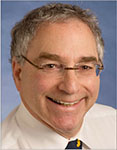
Barry Goldstein has 34 years’ international experience in energy businesses. He is SA’s executive director for Energy Resources, leading a team of geoscientists, engineers, licensing and royalty specialists, and support staff. In this role, Barry is both hunter and games-keeper, for example, both attracting and regulating investment. He is also, at present, the Chair of Australia’s Coal Seam Gas Steering Group and serves on other Council of Australian Governments committees, providing advice to state, territory and Commonwealth Minerals and Energy Resource Ministers. Prior to joining the South Australian government, Barry was the exploration manager and chief geologist for Santos, and the chief geologist for Bridge Oil and the Kuwait Foreign Petroleum Exploration Corporation, after starting with Phillips Petroleum. Barry has explored for, and discovered, energy resources the North Sea, Indonesia, Australia, PNG, and South America. Barry also serves as the: Chairman of the Australian Geothermal Energy Group (AGEG); Australia’s representative and Vice Chairman of the Executive Committee for the IEA’s Geothermal Implementing Agreement; American Association of Petroleum Geologist’s Asia-Pacific EMD Councillor; AAPG House of Delegates representative for the Asia-Pacific region; member of the Australian Centre for Renewable Energy (ACRE) Expert Panel for Geothermal Energy; and, also serves on the Boards of the Geothermal Resource Council (USA) and the Australian School of Petroleum (University of Adelaide). He is a past President of the Petroleum Exploration Society of Australia (PESA), and has served on the boards of PESA (2001–07), the Australian Geoscience Council (2004–07), and the Federation of Australian Scientific and Technologic Societies (2004–07). Barry is a coordinating lead author for the IPCC’s 2012 Special Report on Renewable Energy. barry.goldstein@sa.gov.au |
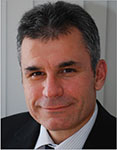
Michael Malavazos has a B.Eng in chemical engineering from the University of Adelaide, and a Masters degree in public policy and management from the Flinders University of SA. He presently holds the position of director of the engineer operations branch in the Energy Resources Division of DMITRE. This position is primarily responsible for environment and safety regulation of the upstream petroleum, transmission pipeline, and geothermal industries in SA. Michael is also responsible for advising the government on upstream energy supply, and economic and development matters. He has played a key role in the establishment and implementation of SA’s objective and risk-based regulatory regime for the upstream petroleum, transmission pipeline, and geothermal industries. This regime has received wide-spread national recognition as best-practice regulation. Michael is very passionate about facilitating community confidence in the industries he regulates by instilling a proactive compliance culture in these industries. He strongly believes this can be achieved through a regulatory framework that builds trust between industry, regulators, and the community through the principles of openness, transparency, certainty, efficiency and flexibility. Michael also proudly holds a part-time lecturing position at the University of Adelaide’s School of Chemical Engineering where he lectures on process plant safety and risk assessment as part of the Masters program. In recognition of Michael’s standing in the area of major accident event regulation, the Commonwealth government recently appointed Michael, in 2011, to the August 2009 Montara offshore drilling rig blow incident investigation team. Michael has authored and co-authored a number of technical and policy papers for a number of professional organisations including APPEA and SPE. michael.malavazos@sa.gov.au |
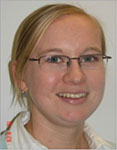
Belinda Hayter holds a Bachelor of Chemical Engineering and a Bachelor of Science from the University of Adelaide, and joined the Department of Primary Industries and Resources South Australia (PIRSA) in the area of petroleum and geothermal regulation in 2003. Under the new Department for Manufacturing, Innovation, Trade, Resources and Energy (DMITRE), Belinda now holds the position of principal engineer—pipelines and policy in the Energy Resources Division. This position is responsible for coordinating the licensing and activity approval processes for new petroleum pipeline projects in SA, in accordance with the requirements of the Petroleum and Geothermal Energy Act 2000, as well as overseeing the technical regulation of both transmission pipelines and production flowlines in accordance with Australian Standard 2885 Pipelines—Gas and Liquid Petroleum. Belinda is an active member of the ME38.3 Committee, responsible for maintaining Part 3 of the Australian Standard 2885. In her present position, Belinda is also involved in the development and review of various areas of legislation and policy relating to petroleum, geothermal energy, and gas storage activities, including amendments to the Petroleum and Geothermal Energy Act enacted in 2009. belinda.hayter@sa.gov.au |
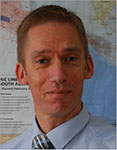
James Coda completed his B.Sc (Hons) degree in combined sciences at the University of Leicester in 1992. He completed his M.Sc in geology at the University of Southampton in 1993. James then began employment in the petroleum industry, initially as a logging while drilling engineer (LWD) and latterly as a drilling engineer. He worked in the North Sea, Africa, Middle East and Northwest Atlantic margins on a variety of onshore and offshore projects. James then spent a short period of time outside the petroleum industry. In late 2004, James joined Primary Industries and Resources South Australia (PIRSA) in their Mineral and Energy Resource Division as an engineer. In mid-2005, James completed a Master of Petroleum Engineering degree at the University of Adelaide. James has remained with the government since then, and is presently the principal engineer–drilling and field operations for DMITRE’s Energy Resources Division. James has had wide experience in the drilling engineering, petroleum engineering and geological fields—and through his work in government—in the environmental field. His expertise in government includes drilling and well operation activities, well integrity, and petroleum and geothermal regulation. In his spare time, James is a member of the South Australian Cricket Association. james.coda@sa.gov.au |
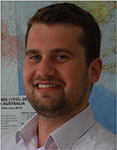
Michael Jarosz graduated with a Bachelor of Mechanical Engineering (Hons) and a Bachelor of Economics from the University of Adelaide in 2008. He has worked in the Engineering and Operations Branch of the Energy Resources Division of DMITRE since 2009. In that time, Michael has dealt with a variety of regulatory and compliance matters relating primarily to the technical regulation of petroleum production facilities and transmission pipelines. michael.jarosz@sa.gov.au |
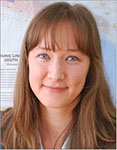
Alexandra Wickham graduated with a mechatronic engineering and arts, majoring in French, degree from the University of Adelaide in 2003. After beginning her career at the Centre for Automotive Safety Research—conducting at-scene crash investigations, in-depth analyses of vehicle collision data, and modelling of pedestrian collisions—Alexandra moved to the Energy Resources Division of DMITRE (formerly PIRSA) in 2008, and is a member of the Engineering Operations Branch. alexandra.wickham@sa.gov.au |
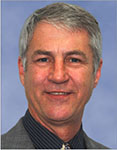
David Cockshell completed his B.Sc (Hons) degree at University of Adelaide in 1975, majoring in geophysics. He was employed as a grade control officer/mine geologist in WA by Windarra Nickel Mines/Western Mining during 1975–76. He joined the SA Department of Mines and Energy in 1977 as a geophysicist. David has remained with the government since then, and is presently the director geophysical operations for SA’s DMITRE Energy Resources Division. David has had experience with a wide range of geophysical techniques in the engineering, environmental, hydrological, and petroleum fields. His expertise covers data acquisition and interpretation, as well as environmental management and petroleum and geothermal regulation. David provides policy advice on land access issues for the resource sector, and represents the mining, petroleum, and geothermal industries on the Great Australian Bight Marine Park and the SA Marine Parks Steering Committee. He has been a member of the Australian Society of Exploration Geophysicists since 1977. In his spare time, David is a very active Rotarian. Member: SEG, PESA, EIANZ (Environment Institute of Australia and New Zealand. david.cockshell@sa.gov.au |
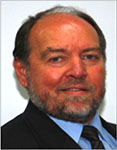
Joe Zabrowarny joined the then SA Department of Mines and Energy Petroleum Group (now DMITRE’s Energy Resources Division) in 1989 and is presently the general manager—resource royalties and licensing. Joe is a qualified land conveyancer and prior to 1989, he already had extensive experience in government financial, title and land access matters. Joe has extensive experience in dealing with land access and royalty issues, including matters relating to the Commonwealth Native Title Act 1993. Joe was part of SA government’s negotiating team that established a template conjunctive Native Title land access agreement for petroleum in SA’s Cooper Basin, and is a key member in the state’s team in negotiations for Native Title and Aboriginal freehold land access agreements for petroleum. Joe has extensive experience in upstream petroleum and geothermal regulation and legislation review, and was the Federal Treasurer of PESA from 1991–93. joe.zabrowarny@sa.gov.au |


